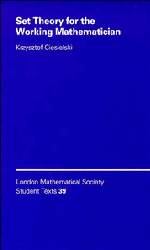Book contents
6 - Subsets of ℝn
from Part III - The power of recursive definitions
Published online by Cambridge University Press: 05 June 2012
Summary
Strange subsets of ℝn and the diagonalization argument
In this section we will illustrate some typical constructions by transfinite induction. We will do so by constructing recursively some subsets of ℝn with strange geometric properties. The choice of geometric descriptions of these sets is not completely arbitrary here – we still have not developed the basic facts concerning “nice” subsets of ℝn that are necessary for most of our applications. This will be done in the remaining sections of this chapter.
To state the next theorem, we will need the following notation. For a subset A of the plane ℝ2 the horizontal section of A generated by y ∈ ℝ (or, more precisely, its projection onto the first coordinate) will be denoted by Ay and defined as Ay = {x ∈ ℝ: 〈x,y〉 ∈ A}. The vertical section of A generated by x ∈ ℝ is defined by Ax = {y ∈ ℝ: 〈x,y〉 ∈ A}.
We will start with the following example.
Theorem 6.1.1There exists a subset A of the plane with every horizontal section Ay being dense in ℝ and with every vertical section Ax having precisely one element.
Proof We will define the desired set by induction. To do so, we will first reduce our problem to the form that is most appropriate for a recursive construction.
The requirement that every horizontal section of A is dense in ℝ tells us that A is “reasonably big.”
- Type
- Chapter
- Information
- Set Theory for the Working Mathematician , pp. 79 - 103Publisher: Cambridge University PressPrint publication year: 1997



